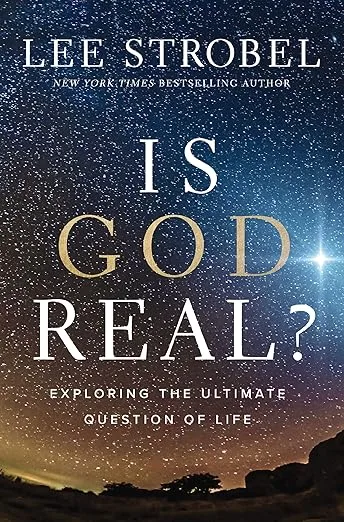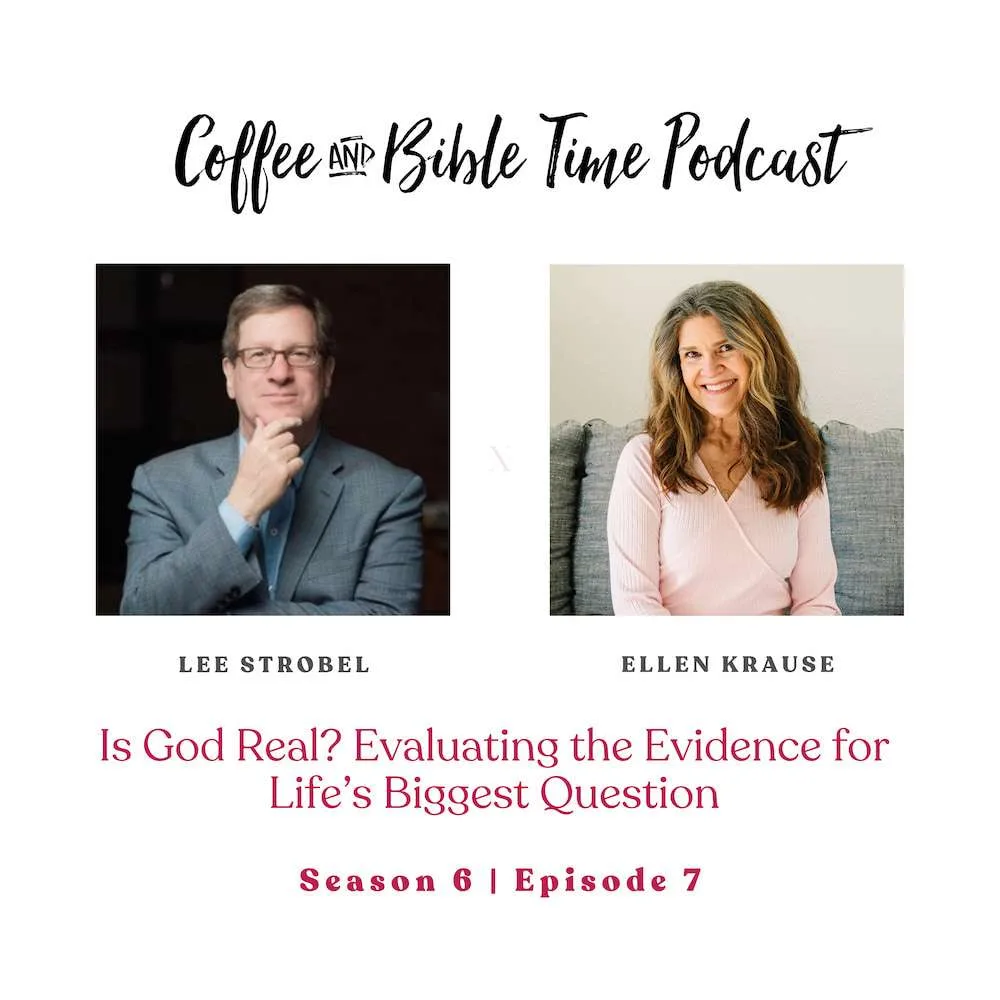Hosted by Ellen Krause
Is God Real?
If you’ve ever wrestled with that question, you’re in good company. In this episode of Coffee and Bible Time, former Chicago Tribune editor and bestselling author Lee Strobel joins us to explore evidence for God’s existence, the truth of Jesus’ resurrection, why God can feel hidden, and how to make sense of suffering. Far from asking you to turn off your brain, Lee invites honest questions and offers clear, research-based answers—drawn from decades of interviews with scholars, skeptics, and seekers.

Subscribe & Listen on:

Why this question matters
We make life’s biggest decisions with limited information—so what do we do with a question as big as “Is God Real”? Lee encourages an investigative approach: evaluate the evidence, test objections, and be willing to follow truth where it leads.
“Doubt isn’t failure; it’s an invitation to seek truth with both heart and mind.”– Lee Strobel
What You’ll Learn
Key Moments
Evidence from science: cosmology & fine-tuning
Over the last half-century, discoveries in cosmology point to a universe that began—which raises the question of a cause beyond space, time, and matter. Lee also highlights the remarkable fine-tuning of physical constants that make life possible. While science can’t put God in a test tube, it can point to a cause that is powerful, intelligent, and personal—a description that coheres with the God of the Bible.
Quick takeaways
- If the universe began, it calls for a transcendent cause.
- The razor-edge calibration of the cosmos strongly suggests design, not accident.
From science to history: did Jesus really rise?
If God is real, has He acted in history? Christianity stakes everything on the resurrection of Jesus. Lee summarizes the historical case with the “4 E’s”:
- Execution – Jesus truly died by crucifixion (multiple ancient sources attest to this).
- Early reports – Resurrection testimony dates to within months of the events, far too soon for legend to overtake history.
- Empty tomb – Even early opponents conceded the tomb was empty; they simply offered rival explanations.
- Eyewitnesses – Multiple, independent sources report individuals and groups convinced they encountered the risen Christ.
If Jesus claimed to be God and then rose from the dead, that’s compelling grounds to trust His identity and message.
“Why is God hidden?”
Many people say, “If God is real, why doesn’t He make Himself obvious?” Lee frames it as a question of love and freedom. God reveals enough for sincere seekers to find Him, yet not so overwhelmingly that He coerces belief. Scripture also says we often suppress what we sense about God (Romans 1), preferring to be rulers of our own lives. In other words, hiddenness isn’t only about the Pitcher (God); it’s also about the Catcher (us).
How to seek sincerely
- Ask honest questions—and chase credible answers.
- Read the Gospels with an open mind; pray, “God, if You’re real, reveal Yourself to me.”
- Talk with thoughtful Christians; examine primary sources, not just opinions about them.
If God is real, why is there suffering?
Every worldview has to face this question. Christianity does so honestly and personally:
- We live in a world marked by human freedom and sin—real choices cause real harm.
- Jesus tells the truth: “In this world you will have trouble.”
- At the cross, God entered suffering and promised ultimate restoration through the resurrection.
If God can bring the greatest good (salvation and hope) out of the worst evil (the crucifixion of His Son), then He can work redemptively in our pain now and forever.
“If God can turn the worst event—the cross—into the greatest good, He can bring good from our suffering.” -Lee Strobel
Doubt that leads somewhere
Lee’s own journey—interviewing leading atheists and scholars—didn’t end in cynicism. It led to Christ. He reminds us that there are many converging lines of evidence for Christianity; a single objection rarely overturns them all. When a question stumps you, let it become your next research assignment, not a dead end.
For parents, students, and seekers
Lee also notes a surprising trend: even though more young people call themselves atheists than in previous generations, many aren’t hardened skeptics—they’re open and curious. If that’s you (or someone you love), this conversation is an invitation to explore without fear or pressure.
Try this this week
- Read: The Gospel of John. Ask: What does Jesus claim, and why?
- Reflect: Where do I most feel God’s “hiddenness” or the weight of suffering?
- Reach out: Share this episode with a friend and discuss your biggest question together.
- Pray: “God, if You are real, help me see truth and respond to You.”
FAQ
Is God real, or is faith just a feeling?
Christian belief rests on historical claims, logical arguments, and lived experience. We survey evidence from science and history in this episode.
If God is real, why doesn’t He make Himself obvious?
Scripture shows God reveals enough for sincere seekers while preserving meaningful freedom—inviting love, not coercion.
If God is good, why is there suffering?
The Bible faces this head-on: God is not distant from pain; Christ suffers with and for us, offering present comfort and future restoration.

Book: Is God Real?
Website: www.leestrobel.com
Bible: NET Translation
Yellow Legal Pads
App/Website: Bible Gateway
Check out our website for more ways to fully connect to God’s Word. There you’ll find:
- Coffee and Bible Time Prayer Journals
- Coffee and Bible Time Courses
- Coffee and Bible Time Membership (weekly devotionals sent right to your inbox!)
Find more great content on our YouTube channel: Coffee and Bible Time
- Our most popular video is “How I Study My Bible + In-Depth Bible Study!” with over 2M views!
Follow us on Instagram
Visit our Amazon Shop
Learn more about the host Ellen Krause
Email us at [email protected]
Thanks for listening to Coffee and Bible Time, where our goal is to help people delight in God’s Word and thrive in Christian living!


 Apple Podcasts
Apple Podcasts Spotify
Spotify
Leave a Reply